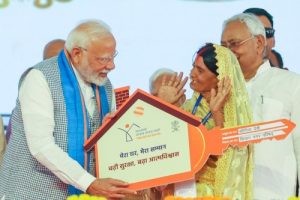Having emerged as a senior partner of the NDA in Bihar for the first time in nearly two decades, the BJP finally seems to have come out of the shadow of its allies in the state but new alliance arithmetic has dragged down their overall vote share since the 2019 Lok Sabha polls.
Riding on the ”Modi wave” in the 2019 Lok Sabha elections, the National Democratic Alliance, which included LJP, had garnered more than 53 per cent votes and won 39 out of 40 seats.
In the Bihar assembly elections, LJP decided to contest on its own and has managed to win less than six per cent votes, while HAM and VIP which were in the opposition camp have become part of the NDA.
As per the latest EC data, the NDA”s combined vote share, including that of BJP, JD(U), HAM and VIP, stands at less than 40 per cent.
In comparison, the RJD-led grand opposition alliance has managed around 37 per cent votes.
Party-wise, JD(U) had got 21.81 per cent votes in the 2019 Lok Sabha elections, but has got only about 15 per cent in the assembly elections. The BJP had got 23.58 per cent of votes in the general elections and has now got close to 20 per cent.
A similar trend was seen in the saffron party”s vote share is several state assembly elections that have taken place since the 2019 Lok Sabha elections.
Its vote share was more than 55 per cent in Jharkhand and 58 per cent in Haryana in the Lok Sabha elections. However, it slumped to 33 per cent and 36 per cent respectively in the assembly polls in these two states, held barely a few months after the general elections.
This election result still assumes significance for the BJP, as it it is the second time after the 2019 general elections when the party on its own or in alliance seems to be getting a majority.

























Add Comment